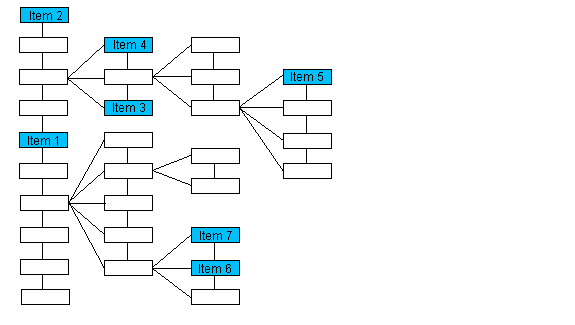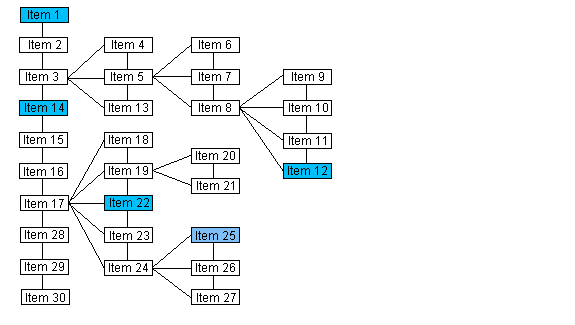L_DicomGetFirstIOD
#include "Ltdic.h"
L_LTDIC_API pDICOMIOD L_DicomGetFirstIOD(pIOD, bTree)
pDICOMIOD pIOD; |
pointer to a DICOMIOD structure |
L_BOOL bTree; |
flag that indicates how to evaluate the IOD Structure |
Returns a pointer to the first item in the IOD Structure. The result depends on whether the IOD Structure is evaluated as a tree or a list.
| Parameter | Description | |
| pIOD | Pointer to a DICOMIOD structure within the IOD Structure. A pointer to the DICOMIOD structure that contains the first item in the IOD Structure will be returned. | |
| bTree | Flag that indicates how the IOD Structure will be evaluated. Possible values are: | |
| Value | Meaning | |
| TRUE | Evaluate the IOD Structure as a tree. | |
| FALSE | Evaluate the IOD Structure as a list. | |
Returns
!NULL |
A pointer to a DICOMIOD structure that contains the first item in the IOD Structure. |
NULL |
The IOD Structure is empty. |
Comments
If the IOD Structure is evaluated as a tree structure, this function returns the first item on the same level as pIOD with the same parent as pIOD. Please note that the numbering of the items in this first illustration is arbitrary and does not imply order.

If the passed pointer points to : |
The function returns a pointer to : |
Item 1 |
Item 2 |
Item 3 |
Item 4 |
Item 5 |
Item 5 |
Item 6 |
Item 7 |
NULL |
Item 2 |
If the IOD Structure is evaluated as a list, the first item in the list is returned. Please note that the numbering of the items in this illustration does indicate the order of the items when the IOD Structure is evaluated as a list.

If the passed pointer points to : |
The function returns a pointer to : |
NULL |
Item 1 |
Item 12 |
Item 1 |
Item 14 |
Item 1 |
Item 22 |
Item 1 |
Item 25 |
Item 1 |
The following functions will also help you navigate the IOD Structure as either a tree or a list:
If you evaluate the IOD Structure as a tree, you can also use the following functions to navigate the tree:
Required DLLs and Libraries
|
For a listing of the exact DLLs and Libraries needed, based on the toolkit version, refer to Files To Be Included With Your Application |
Win32, x64, Linux.
Example
This example displays in a tree control the list of the IOD table
L_VOID ShowList(HWND hDlg){TV_INSERTSTRUCT tvInsert;TV_ITEM tvItem;HTREEITEM hItem;pDICOMIOD pIOD;pIOD = L_DicomGetFirstIOD(NULL, FALSE);while (pIOD != NULL){tvItem.mask = TVIF_TEXT;tvItem.pszText = pIOD->pszName;tvInsert.hParent = TVI_ROOT;tvInsert.hInsertAfter = TVI_LAST;tvInsert.item = tvItem;hItem = (HTREEITEM)SendMessage(hDlg, TVM_INSERTITEM, (WPARAM)0,(LPARAM)(LPTV_INSERTSTRUCT)&tvInsert);pIOD = L_DicomGetNextIOD(pIOD, FALSE);}}L_INT DicomGetFirstIODExample(HWND hDlg){ShowList(hDlg);return DICOM_SUCCESS;}
© 1991-2017 LEAD Technologies, Inc. All Rights Reserved.
